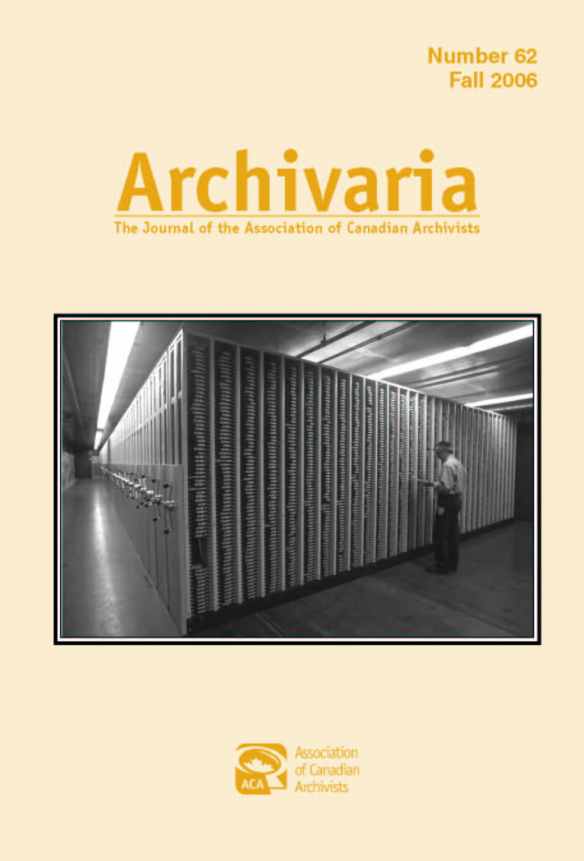Records of Dubious Research Value: Developing and Implementing Acquisition Policy for the Records of Non-Profit Organizations at Library and Archives Canada
Abstract
In response to severe budget cuts, Library and Archives Canada introduced a strict acquisition policy for private archives in 1995 designed to significantly reduce acquisition activity. Part of the new policy required non-profit organizations to contribute resources, human or monetary, toward the arrangement and description of their records as a prerequisite to acquisition by LAC. This contribution could range anywhere from full-funding to assistance in preliminary arrangement and description. The adoption of this acquisition policy reflected an emerging view that the fonds of organizations held less archival value than those of individuals and, in effect, downgraded the records of organizations at LAC as a priority for acquisition. This article examines the theoretical environment – the debates and assumptions – in the Canadian archival community and within LAC leading up to this decision, and examines LAC’s experience of implementing this policy over ten years through seven case studies of organizations upon which it had an impact. It concludes with a discussion of the lessons learned through this practical experience and some more general reflections on the archival record of non-profit organizations.
RÉSUMÉ
Pour répondre à des compressions budgétaires draconiennes, Bibliothèque et Archives Canada a introduit une politique d’acquisition limitée pour les archives privées en 1995 dans le but de restreindre de façon significative les activités d’acquisition. Un aspect de cette nouvelle politique exige que les organismes à buts non-lucratifs fournissent des ressources – monétaires ou humaines – pour le classement et la description de leurs documents avant que ceux-ci ne soient acquis par BAC. Cette contribution peut se situer n’importe où entre le financement complet du traitement et l’aide dans le classement et la description préliminaire des documents. L’adoption de cette politique d’acquisition reflète un nouveau courant qui présente les fonds des organisations comme ayant une moins grande valeur archivistique que les fonds des individus et, par la force des choses, diminue la priorité de l’acquisition de ces documents par BAC. Ce texte examine le contexte théorique – les débats et les présomptions – dans la communauté archivistique canadienne et à BAC qui a précédé cette décision. Ensuite, il examine l’expérience de BAC dans la mise en oeuvre de cette politique dans les dix années qui ont suivi, en analysant sept études de cas d’organisations sur lesquelles elle a eu un impact. L’auteur termine en considérant les leçons tirées à partir de cette expérience pratique, ainsi que par des réflexions de nature générale sur les documents archivistiques des organisations à buts non-lucratifs.
Authors of manuscripts accepted for publication retain copyright in their work. They are required to sign the Agreement on Authors' Rights and Responsibilities that permits Archivaria to publish and disseminate the work in print and electronically. In the same agreement, authors are required to confirm that "the material submitted for publication in Archivaria, both in its paper and electronic versions, including reproductions of other works (e.g. photographs, maps, etc.) does not infringe upon any existing copyright." Authors of manuscripts accepted for publication retain copyright in their work and are able to publish their articles in institutional repositories or elsewhere as long as the piece is posted after its original appearance on archivaria.ca. Any reproduction within one year following the date of this agreement requires the permission of the General Editor.





